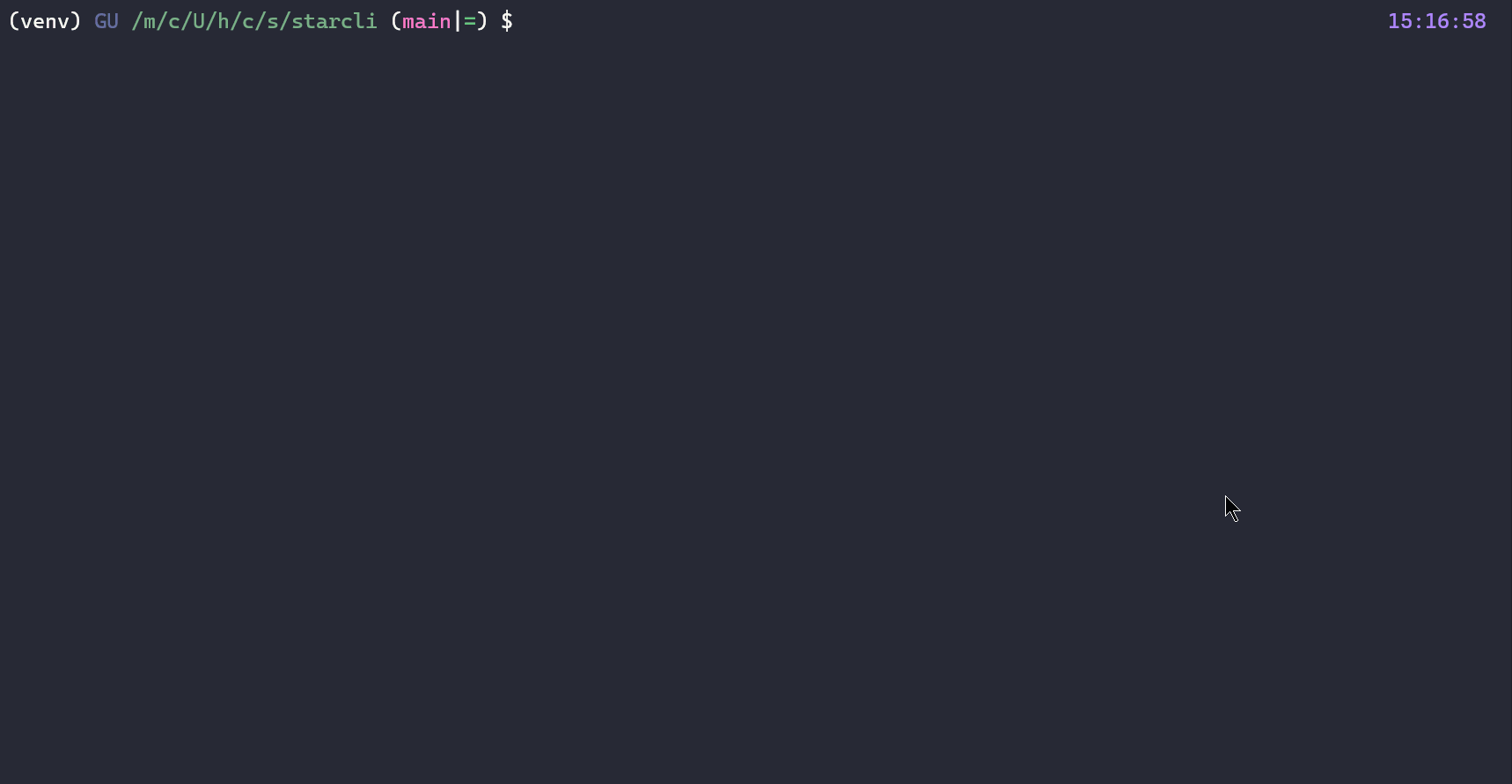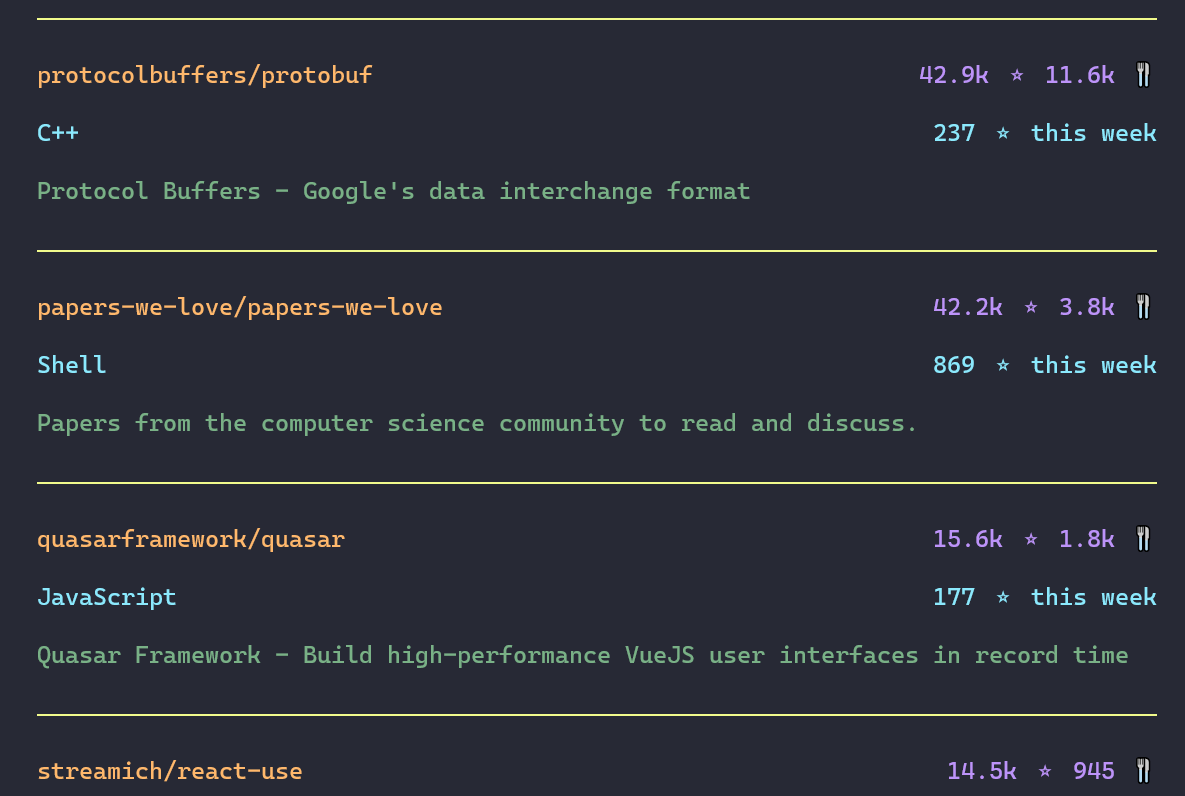Browse trending projects on Github from your command line 💻
- Filters
- Stars
- Pushed date
- Created date
- User
- Topic
- Language
- Spoken language
- Use generic GitHub search API or GitHub trending
- Auth token (optional)
- Paged output
- Different layouts
- Requires Python 3.6 or greater
pip3 install starcliUsage: starcli [OPTIONS]
Search and query GitHub repositories
Options:
-l, --lang TEXT Language filter eg: python
-S, --spoken-language TEXT Spoken Language filter eg: en for English,
zh for Chinese, etc
-c, --created TEXT Specify repo creation date in YYYY-MM-DD,
prefixing with >, <= etc is allowed
-t, --topic TEXT Search by topic, can be specified multiple
times
-p, --pushed TEXT Specify date of last push in YYYY-MM-DD, >=<
allowed
-L, --layout [list|table|grid] The output format (list, table, or grid),
default is list
-s, --stars TEXT Amount of stars required, default is
'>=100'. Can use 123, <10, etc.
-r, --limit-results INTEGER Limit the number of results. Default: 7
-o, --order [desc|asc] Order of repos by stars shown, 'desc' or
'asc', default: desc
--long-stats Print the actual stats number (1300 instead
of 1.3k)
-d, --date-range [today|this-week|this-month]
View stars received within time range,
choose from: today, this-week, this-month
-u, --user TEXT Search for trending repositories by username
--auth TEXT GitHub personal access token in the format
'username:password'.
-P, --pager Use $PAGER to page output. (put -r in $LESS
to enable ANSI styles)
--debug Turn on debugging mode
--help Show this message and exit.
Switch layouts using --layout {list|table|grid}, or use the short option -L
list
table
grid
All three of the layout options support clickable links for repository names. If your terminal supports links, you can directly click on the name and it takes you to the GitHub repository in your browser.
For example, you only want to find popular Python repos, you can use --lang or -l:
starcli --lang python
Here, we used starcli -l python -L grid, which is python with grid layout:
If you wanted to find repos in your native language, you can use --spoken-language or -S:
starcli --spoken-language zh
The above command lists down repos written in Chinese. A full list of language codes is available here
Note that (like --date-range) options like --topics, --pushed, --created won't take effect
because -d uses a different search mechanism to find results.
(Recommended to be used with --created)
The default range is >=100 stars.
Use --stars or -s to specify what you want,
for example, if you want to find repos that has more than 100 stars, you can use:
starcli -s '>100'
Note that if you do something like >1000 not many repos can have
more than 1000 and is created within around 200 days,
to specify date of creation, use --created, see below.
Wish to know what's trending this week?!
You can view the number of stars a repo received today, this week or this month by using the --date-range or -d option:
starcli -d this-week -L table
This command will also display the number of stars received for each repo this week in the form of a table.
--created/-c accepts a date in ISO8601 format: yyyy-mm-dd
For example, for repos created on 1st January 2014, use:
starcli --created 2014-01-01
To search for repos that are created on or after 1st January 2014, use:
starcli --created '>=2014-01-01'
This option helps you to filter by topics. You can use --topics or -t to include
a topic in search.
This option can be used multiple times.
starcli -l python -d 2020-07-06 -t deep-learning -t pytorch
Use --pushed/-p when you want to find popular repos that are
last updated on a given date, say 2020-01-01 for 1st of Jan
2020:
starcli -p 2020-01-01
You can also prefix the value with ">=<" like:
starcli -p '>=2020-01-01'
This is find repos that have last pushed after or on January the 1st, 2020. Read more about the >=< syntax: GitHub Docs
Recommended to be used with --stars and/or --date-created.
Finding trending projects by GitHub username is supported too. Use --user or -u to do so,
provide a valid GitHub username after that, like:
starcli -u torvalds
starcli -u gvanrossum
You can use --date-range or -d and specify today, this-week, or this-month,
so that GitHub Trending search function will be used to find popular repos
and tell you how much stars are gained this day/week/month depending on the
option you used.
starcli -d this-week
Note that (like --spoken-language) options like --topics, --pushed, --created won't take effect
because -d uses a different search mechanism to find results.
Don't like the default 7? You can change it to something else,
using --limit-results or -r followed by an integer:
starcli -r 2
The above will only give you two repos. This is useful if
you want to put it in your .bashrc, .zshrc, or fish_greeting function.
Just add starcli -r 3 -L grid in there, and every time you open your terminal,
you will find 3 trending repos printed neatly in a grid format, great way to start your
day (a bit like the Hacker Tab Extension 😆 ).
If you have used starcli too much in a specified amount of time, rate limit will be hit.
To avoid this, use authenticate using --auth and provide your username and password
starcli --auth "username:password"
- Issues, bug reports, or feature request: Don't hesitate to open an issue in this repo
- Feedback: any general feedback or questions about using StarCLI you can leave a comment on our Product Hunt page, remember to be nice :)
For contributing guidelines and how to set up your development environment, please
read CONTRIBUTING.md.
Remember that all contributions to this project should follow its
CODE OF CONDUCT.
- CommandLine Argument parser: Click
- Colored and table console print:
rich(with click and colorama) - HTTP library to send requests:
requests
Thanks goes to all of these wonderful people (emoji key):
This project follows the all-contributors specification. Contributions of any kind welcome!
This project was forked from
githunt (python)
and its initial intention was to rewrite that project to use
Rich instead of colorama + tabulate, but now it has so much more features
than before, thanks everyone!












